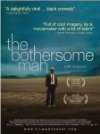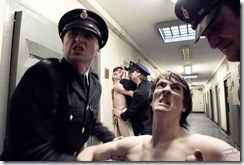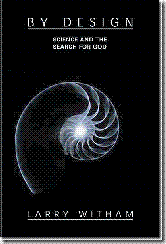For many Christians, the word postmodernism represents all that is bad about the contemporary world. An unholy trinity of postmodernist thinkers would be Jacques Derrida, Jean-Francois Lyotard, and Michel Foucault. Could we think of anything worse than actually allowing these three to speak in church? Well James K A Smith has done just that in his brilliant little book Who's Afraid of Postmodernism: Taking Derrida, Lyotard, and Foucault to Church.
For Smith, these three postmodernist thinkers have some very important things to say to Christians. And what they have to say will surprise you and make you rethink your approach to Christian belief and practice. And the message is equally important for "orthodox", "traditional" believers and those who see themselves as part of the "emergent" or "progressive" streams of Christianity.
The first thing that Smith does is identify the essential message of each of his three conversationalists. They are:
- "There is nothing outside the text" (Derrida).
- Postmodernity is "incredulity toward metanarratives" (Lyotard).
- "Power is knowledge" (Foucault).
After this introductory chapter, Smith spends one chapter each on the above essential messages from Derrida, Lyotard, and Foucault. In each chapter, he teases apart the meaning of each of the statements trying to represent the thought of each philosopher as carefully as possible. He then applies his understanding to the contemporary church. Here is a summary of each chapter as provided by Smith in his first chapter:
- 'Derrida. Deconstruction's claim that there is "nothing outside the text" ... can be considered a radical translation of the Reformation principle sola scriptura. In particular, Derrida's insight should push us to recover two key emphases of the church: (a) the centrality of Scripture for mediating our understanding of the world as a whole and (b) the role of community in the interpretation of Scripture.
- Lyotard. The assertion that postmodernity is "incredulity toward metanarratives" is ultimately a claim to be affirmed by the church, pushing us to recover (a) the narrative character of Christian faith, rather than understanding it as a collection of ideas, and (b) the confessional nature of our narrative and the way in which we find ourselves in a world of competing narratives.
- Foucault. The seemingly disturbing, even Nietzschean claim that "power is knowledge" should push us to realize what MTV learned long ago: (a) the cultural power of formation and discipline, and hence (b) the necessity of the church to enact counterformation by counterdisciplines. In other words, we need to think about discipline as a creational structure that needs proper direction. Foucault has something to tell us about what it means to be a disciple.' (pp. 23-24)
In his last chapter, Smith turns his attention to a movement known as Radical Orthodoxy which he believes comes closest to incarnating the principles he has derived from postmodernist thought as outlined above. The section titles for this chapter are wonderfully enticing:
- Redeeming Dogma: A More Persistent Postmodernism
- Recovering Tradition: Taking History Seriously
- Renewing the Body: Space, Place, and Incarnation
Smith is a superb writer, explaining deep concepts simply and elegantly. Each chapter begins with a summary and analysis of a contemporary movie (eg, The Matrix – Chapter 1; Memento – Chapter 2) which forms the basis of his discussion of each theorist. The last chapter draws on Whale Rider to illustrate the way in which the contemporary Christian church needs to live in the world while drawing on ancient traditions to express and form its work and worship.
Unfortunately, Smith doesn't engage in a discussion about relativism and pluralism — both issues of concern to many Christians. He briefly mentions relativism in a footnote, suggesting that it is the fruit of modernist thought rather than postmodernist. And on page 50 he engages in a brief discussion of hermeneutic, or interpretive, pluralism. I would have liked to see a deeper discussion. But they can certainly be found elsewhere.
Who's Afraid of Postmodernism is essential reading for the contemporary Christian. Smith's analysis is scholarly (he has published widely in postmodernist thought) and penetrating. And he does a wonderful job of challenging the way we think.
I would also recommend this book to those who have moved away from their religious faith. In particular, the third chapter of the book entitled Where Have All the Narratives Gone? is a brilliant analysis of the hegemony of the science narrative in society (promoted especially by writers such as Richard Dawkins who are thoroughly modernist in their approach). In addition, those interested in the emerging church movement will discover that there is much that is modernist in the approach (even though it claims to be postmodernist).
Who's Afraid of Postmodernism? packs a potent punch. Put this on your reading list for the new year!
Related Links
- Christianity and Postmodernism
- Postmodernism and Christianity
- Allthings2all: Postmodernism and Christianity
- What Exactly Is Postmodernism? (Christianity Today article)
More books ..
Darkness Is My Only Companion: A Christian Response to Mental IllnessAn excellent help for Christians suffering from a mental illness. Readable, practical, balanced. The author's descriptions of her own illness are very powerful.
Captured by Grace: No One Is Beyond the Reach of a Loving GodAn inspirational meditation on grace using the hymn Amazing Grace for its structure.
HouseSupernatural thriller about a group of people who have to abandon their broken down car on a highway and find themselves in a house where a mad man plays a game of cat and mouse. One game. Seven Players. Three Rules. Game ends at dawn. Co-written by Frank Peretti and Ted Dekker.
The Nature of the Atonement: Four ViewsOne of the books in the Four Views series. Gregory Boyd, Joel B Green, Bruce Reichenbach, and Thomas R Schreiner share their perspectives on the atonement and critique the others. Up-to-date treatment of the issue.
Is God to Blame?: Moving Beyond Pat Answers to the Problem of Evil
It is great to see some books coming out that take a much more biblical, intelligent approach to the problem of evil and suffering. Jesus Christ is central in the book. 'What comes through is a hopeful picture of a sovereign God who is relentlessly opposed to evil, who knows our sufferings and who can be trusted to bring us through them to renewed life.' (Back cover) Highly recommend.








 Christianity and Homosexuality: Some Seventh-day Adventist Perspectives is a collection of essays dealing with the increasingly significant issues related to people who have a homosexual orientation and the way Christian churches relate to them.
The book is edited by David Ferguson, Fritz Guy, and David Larson and is the product of a collaboration between SDA Kinship, International (an support organisation for gay Adventists) and the Kinship Advisory Board (a group straight Adventist leaders formed to advise and lead SDA Kinship).
The subtitle of the book is important. The writers all come from a Seventh-day Adventist (SDA) perspective. That does not mean they write from any official SDA position. In fact, much of the book may make the officials of SDAism somewhat uncomfortable. It is published by
Christianity and Homosexuality: Some Seventh-day Adventist Perspectives is a collection of essays dealing with the increasingly significant issues related to people who have a homosexual orientation and the way Christian churches relate to them.
The book is edited by David Ferguson, Fritz Guy, and David Larson and is the product of a collaboration between SDA Kinship, International (an support organisation for gay Adventists) and the Kinship Advisory Board (a group straight Adventist leaders formed to advise and lead SDA Kinship).
The subtitle of the book is important. The writers all come from a Seventh-day Adventist (SDA) perspective. That does not mean they write from any official SDA position. In fact, much of the book may make the officials of SDAism somewhat uncomfortable. It is published by  I’d like to make a couple of comments about this structure because I think it is highly significant. Notice the location of the scriptural and theological perspectives. Most conservative Christians would want to place the Bible and theology at the beginning of the book and filter all other perspectives through its lense. However, the editors of this book perhaps recognise that placing the Bible at the beginning of the discussion would destroy any chance of an open inquiry into the subject of homosexuality.
I don’t think there is any doubt that the majority of Christians would make the assumption that the Bible condemns homosexuality outright. Beginning from this premise, a great deal of what this book discusses would be dismissed from the outset. However, by taking the approach they have, the editors lead us to the text after considering a whole range of extra-biblical material that makes us realise that the text needs, perhaps, to be read afresh and our traditional understandings rigorously critiqued. Let me lay out the journey the editors take us on -- at least as I read it.
I’d like to make a couple of comments about this structure because I think it is highly significant. Notice the location of the scriptural and theological perspectives. Most conservative Christians would want to place the Bible and theology at the beginning of the book and filter all other perspectives through its lense. However, the editors of this book perhaps recognise that placing the Bible at the beginning of the discussion would destroy any chance of an open inquiry into the subject of homosexuality.
I don’t think there is any doubt that the majority of Christians would make the assumption that the Bible condemns homosexuality outright. Beginning from this premise, a great deal of what this book discusses would be dismissed from the outset. However, by taking the approach they have, the editors lead us to the text after considering a whole range of extra-biblical material that makes us realise that the text needs, perhaps, to be read afresh and our traditional understandings rigorously critiqued. Let me lay out the journey the editors take us on -- at least as I read it.